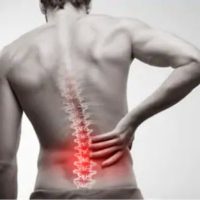What Is A Herniated Disc? Is It Serious?

When people are in accidents, they often complain of or are diagnosed with herniated or slipped discs. A herniated disc has almost become a “catch all” phrase for every type of back injury, but a herniated or ruptured disc is actually a very specific—and often, painful and serious—type of injury.
The Anatomy of the Back
A little understanding of the anatomy of the back can help you understand what a herniated disc is.
Your back has a series of small bones running up and down, called vertebrae. The vertebrae are hard and bony, and they protect the spinal column and spinal nerves that run through the middle of the vertebrae.
But vertebrae are bones, and bones by themselves don’t move. Our back needs to be able to move, which means that each individual vertebrae needs to have a cushion between them. That cushion is the disc. The discs in your back serve two functions—they allow your back to move, providing flexibility, and they also prevent the bones of each vertebrae from grinding up on each other, and wearing down.
How Discs Get Injured
Because of age, or the kind of impact that is suffered in an accident, the discs in our back can become injured. Sometimes, they can flatten, and wear out. Other times, they can be forced out of place, so they aren’t evenly and neatly between the vertebrae on the top and bottom of the disc. Other times, they can rupture, when the jelly like interior is “squashed out” of its encasing.
Why We Have Pain
When discs get pushed out of place, or when the jelly like material inside of them gets pushed out (ruptures), we can have pain—sometimes, serious pain—because the disc or the insides of them can press against or push against the spinal nerves that are so very close to the vertebrae and the discs.
The amount of pain and disability that you feel, often depends on how much of a rupture has happened, and how much of the disc is impinging on, or pushing against your spinal nerves.
Symptoms of Disc Injury
Common symptoms of a ruptured or herniated disc include pain, numbness, or tingling in the extremities. In more serious cases, there may be a loss of bowel or bladder control. Of course, serious pain in the back itself, even when at rest, is a common symptom as well.
Some disc herniations will get better and then worse and the better again. Often the pain can be managed through regular therapy. An epidural injection can ease pain for a few months. In more serious cases, surgery may be required.
Doctors may remove a damaged or protruding disc, and fuse the surrounding vertebrae together, and today there are even artificial vertebrae that can be inserted.
Have you suffered a back injury because of an accident? Call the Boston personal injury lawyers at The Law Office of Joseph Linnehan, Jr. today at 617-275-4200 for help in your injury case.
Sources:
mayoclinic.org/diseases-conditions/herniated-disk/symptoms-causes/syc-20354095
aans.org/en/Patients/Neurosurgical-Conditions-and-Treatments/Herniated-Disc
